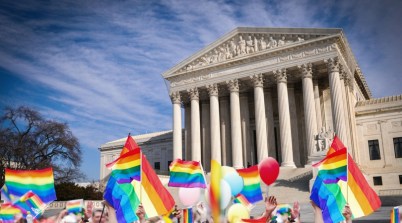Catholic Responses Limited on U.S. Supreme Court’s Masterpiece Ruling

Normally, shortly after a significant event like such a ruling, Bondings 2.0 compiles responses from Catholic individuals, organizations, and other relevant voices. But we have not published such a post until now as we expected more responses than the few we reference today. To read New Ways Ministry’s statement on the ruling, click here.
John Gehring of Faith in Public Life wrote in National Catholic Reporter that “the fundamental question of how to properly balance respect for religious conscience in the marketplace with basic dignity for LGBTQ people” was left unresolved. Religious liberty, he claimed, has been “weaponized” by the Religious Right pushing back against LGBT equality. But a “liberal intolerance” against religion also worries him. He suggested:
“Those of us who identify as progressive people of faith, and value both religious liberty and equality for LGBTQ people, have a particularly important role to play in reminding those on the left who are tempted to smugly dismiss sincere religious convictions that their disdain does not help the cause of equality. One does not have to agree with the religious convictions of someone else — and can indeed strongly oppose efforts to enshrine those beliefs above other rights — to still refrain from portraying that person and her views in ways that are cartoonish and offensive. . . .
“You don’t have to be a Catholic or agree with the church’s opposition to civil same-sex marriage to appreciate how this framework [of both/and rather than zero-sum] might help us through the culture wars. Surveys find that most Americans value religious freedom and dignity for our LGBTQ neighbors, friends and family members. Let’s make that case with passion and without compromising core convictions. As we do this, let’s also never fail to show respect, and treat with civility, those who argue with principle and equal passion against us.”
Marianne Duddy-Burke, executive director of DignityUSA, released a statement that focused on the specificity of the ruling. It is “not a sweeping policy change,” she stated, and continued:
“People of faith have diverse beliefs about sexual orientation and gender identity, and we believe that this reality must be respected. However, belief should never harm another person. Our entire civil rights structure in this country is based on ensuring that everyone has equality under the law. . .It is very unfortunate that this ruling reinforces the ‘God vs. gay’ narrative that has pervaded our discourse and policy-making. Many LGBTQI people and others who are working towards full equality in our country are people of deep faith and know that our identities are sacred gifts.”
Patrick Hornbeck, chair of Fordham University’s Theology Department, agreed that the Court’s ruling was limited. He wrote about this ruling and the need to respect LGBT-negative voices in Religion Dispatches:
“[W]hat’s more interesting is what the Court decided not to decide. For one thing, the Court did not conclude that Phillips was not in violation of Colorado’s antidiscrimination law: it held only that if he was, he did not receive a sufficiently impartial hearing. . .Justice Kennedy’s other argument, that the comments of one of the commissioners demonstrated anti-religious animus, could indicate that the Court (and courts more generally) will be vigilant going forward in ensuring the respectful treatment of those who disagree with the growing majority of Americans who support equality for LGBTQ+ citizens.”
Perhaps so few Catholic responses to Masterpiece reflect the relatively minor impact this case will now have, despite high expectations. As the responses above indicate, the Supreme Court ruled not on the merits of the arguments, but on a procedural matter. A similar case without a government official’s perceived bias against religious beliefs could have had a very different outcome. The challenge remains before Catholics who support LGBT equality to keep articulating a positive vision of civil rights, both in society and in the Church, which is dialogical with opponents rather than disparaging of them.
—Robert Shine, New Ways Ministry, June 19, 2018




Leave a Reply
Want to join the discussion?Feel free to contribute!